3 min read
Honchō Scoops Up Two UK Search Awards!
It’s official, we've added not one, but two shiny trophies to our awards cabinet! We’re over the moon to share that we’ve triumphed at the UK Search...
August saw a lot of important updates and announcements being made in the world of search. We have put together the most important updates from the previous month so you don’t miss anything in the ever-changing world of SEO and PPC.
Those with GMB profiles can now edit their business information while they’re being viewed in Google Maps or in the search results. This will allow for quick and easy updates to be made without having to log-in to Google My Business, vital in a time in which businesses are constantly adapting.
You will have to be logged into the Google account used to verify your business to be able to do this, but if you are logged in then you can edit your profile with ease.
You can:
This is a small yet important change to support and promote effective communications between businesses and customers. With users increasingly doubting business information available to them, this should help to improve the quality of info on Google.
In the second week of August, many noticed high volatility in rankings for certain terms which affected search results negatively. The majority of those who noticed this assumed a new Google update to be the cause. However, Google was quick to dismiss this and stated that these changes were due to an error from their part.
dir=”ltr” lang=”en”>On Monday we detected an issue with our indexing systems that affected Google search results. Once the issue was identified, it was promptly fixed by our Site Reliability Engineers and by now it has been mitigated. Thank you for your patience! — Google Webmasters (@googlewmc) August 11, 2020
Google’s John Mueller confirmed that it was not an update, but was actually a glitch which they were experiencing. John Mueller and the Google Webmasters’ Twitter account confirmed that the issue was resolved.
This put many at ease as the glitch caused some major issues. One of the impacts was on recipe searches, with Google displaying unrelated recipes. It also impacted local searches, with searches for local businesses giving non-local results. The glitch also seemed to affect niches and affiliate websites the worst. This was experienced on a global scale which explains why Google was quick to resolve it and let users know.
Lead form extensions have been added to YouTube and Discover campaigns, allowing advertisers to attract attention and customers. This is an exciting opportunity for advertisers to gain leads, with early tests showing a reported increase of 10 times for completed leads. This suggests that YouTube could be an extremely effective channel to acquire leads and generate customers.
The form appears under the ads once the user expresses an interest. This expands into a form which users fill out. If they are logged into their Google accounts, it will automatically fill. Users can submit their information without ever having to leave YouTube.
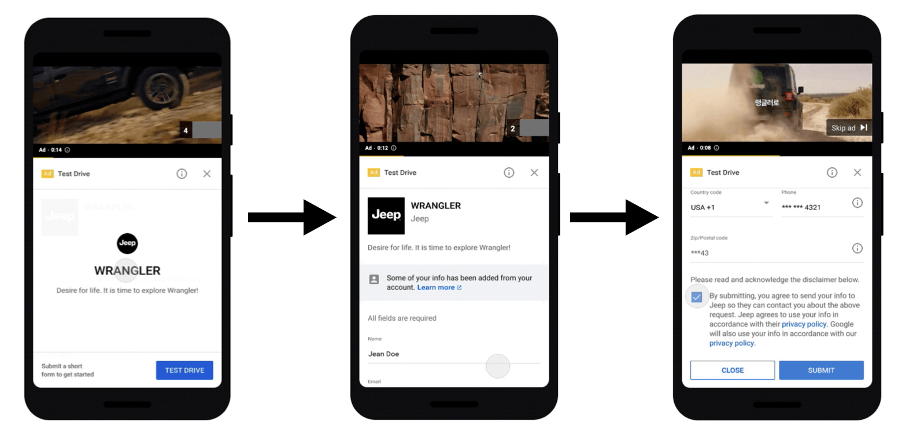
Advertisers can now use Maximise conversions bidding through app campaigns. This means that App Campaigns can now be optimised to generate as many installs within the shortest time frame possible. Advertisers can simply enter their budget and Google’s machine learning algorithm takes care of the rest.
To get started with Maximize conversions bidding:
Later this year, an update will be released to simplify the creation process with an image optimisation tool. This tool will mean that advertisers will only have to upload three aspect ratios to scale ads across the eligible campaigns. Higher quality images can also be uploaded as the image file size limit is increasing from 150KB to 5MB. Images that are currently running that do not meet the new aspect ratio will stop running ads and be removed.
Retailers now have a new way to control how their information and products appear in the Google SERPs. This new method involves using robots meta tags and HTML attributes being added to the content which will change how it appears in Google search. Retailers will be able to modify the image size, prevent snippets and content from appearing or specify a maximum snippet length with this new change.
Display No Snippet For Products
By adding a “nosnippet” robots meta tag on product pages, retailers can prevent any snippet appearing for the page in search results.
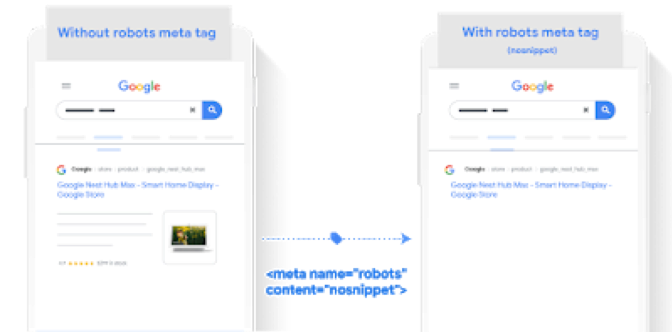
Specify A Maximum Snippet Length
To set a maximum snippet length for the number of characters, you can use a “max-snippet:(number)” robots meta tag. If the snippet would have been bigger, the page will be removed from any free listing experience.
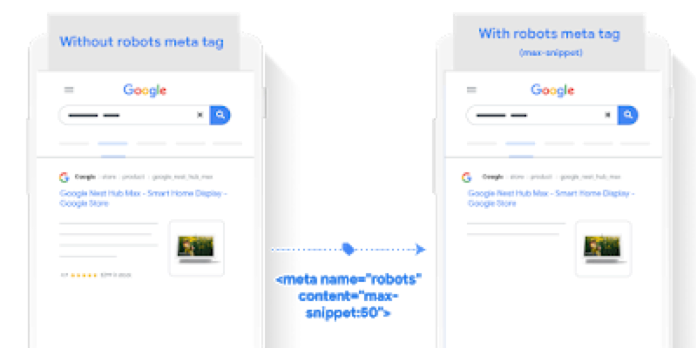
Specify A Maximum Image Size
Product images in snippets can be customised by using the “max-image-preview:(setting)” robots meta tag.
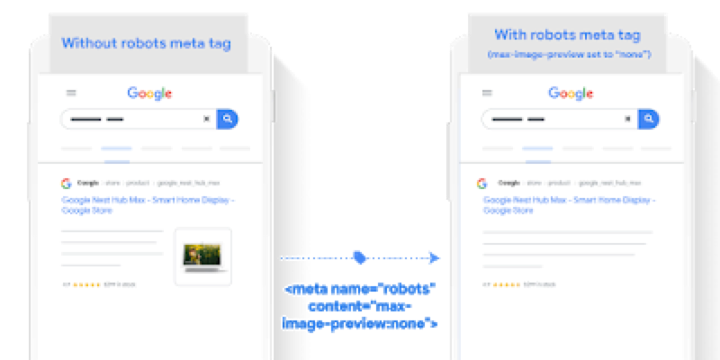
Prevent Content From Appearing In A Snippet
Using the “data-nosnippet” HTML attribute will prevent a specific section of content from being included in the search snippet.
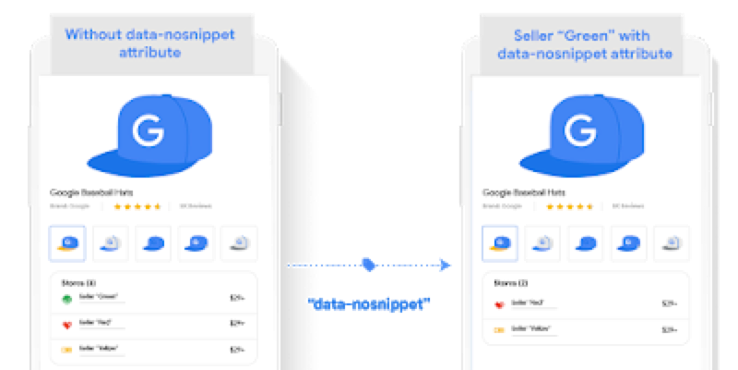
Activity Cards came out in 2019 to help users continue previous searches and this year it’s been updated.
This update specifically targets searches related to jobs, recipes and shopping. These activity cards contain more detail than a regular activity card and are capable of displaying rich media, such as thumbnails of products and meals.>
Shopping Activity Cards – Activity cards for shopping-related searches will show you products you’ve been researching, even if you never visited an actual product page.>
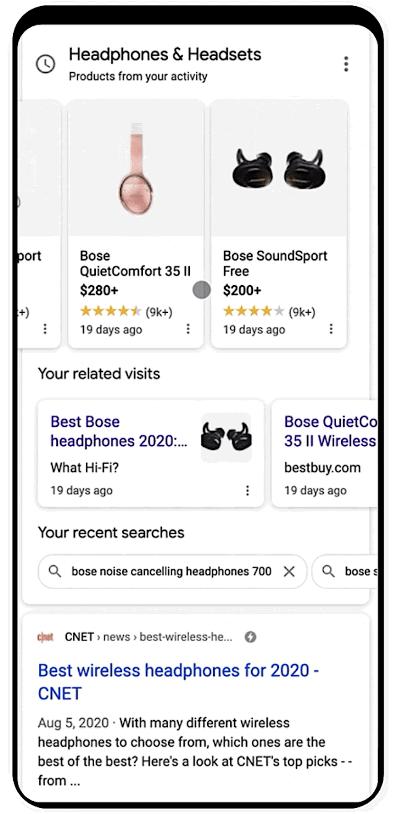 >
>
Job Activity Cards – For job searches, the activity card will show new, relevant job postings that have been published since your last search.>
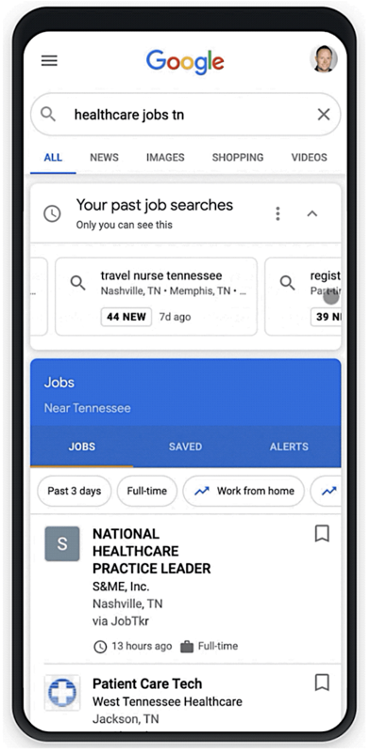
Recipe Activity Cards – Recipe activity cards will show relevant recipes as well as providing a preview thumbnail of the food.
A recent Google My Business update highlights the last time a page’s business hours were updated. Google has not provided more information on whether this is a permanent change or if it will be temporary, but this is a welcomed update for retailers and users alike.
As many businesses have irregular hours due to COVID restrictions, users are often left doubting the information on GMB profiles as they fear it is out-dated. However, with this update, users can see when the information was last updated, giving them confidence in the validity of the information. Especially as “near me” searches and calls through GMB profiles increases, this is an important update which will help both consumers and businesses.
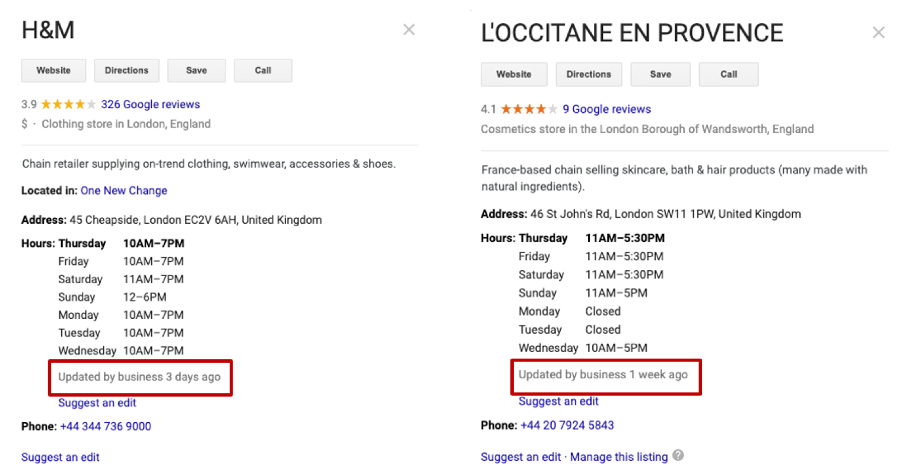
An update to Google Chrome highlights fast pages with a new label. This feature is currently rolling out to the beta version of Chrome 85 on Android. Once this has been completely rolled out to everyone with the final version of Chrome 85, users will see “fast page” labelling if they have Lite mode or “Make Searches and Browsing Better” turned on.
The “fast page” label is assigned based on real-world historic data. Websites will get this label if Google determines that you are providing the user with a good experience. This is dependent on if they meet or exceed all metric thresholds for Core Web Vitals, which measure Cumulative Layout Shift, Largest Contentful Paint and First Input Delay. If there is no historical data, Google will use the history of the website’s host.
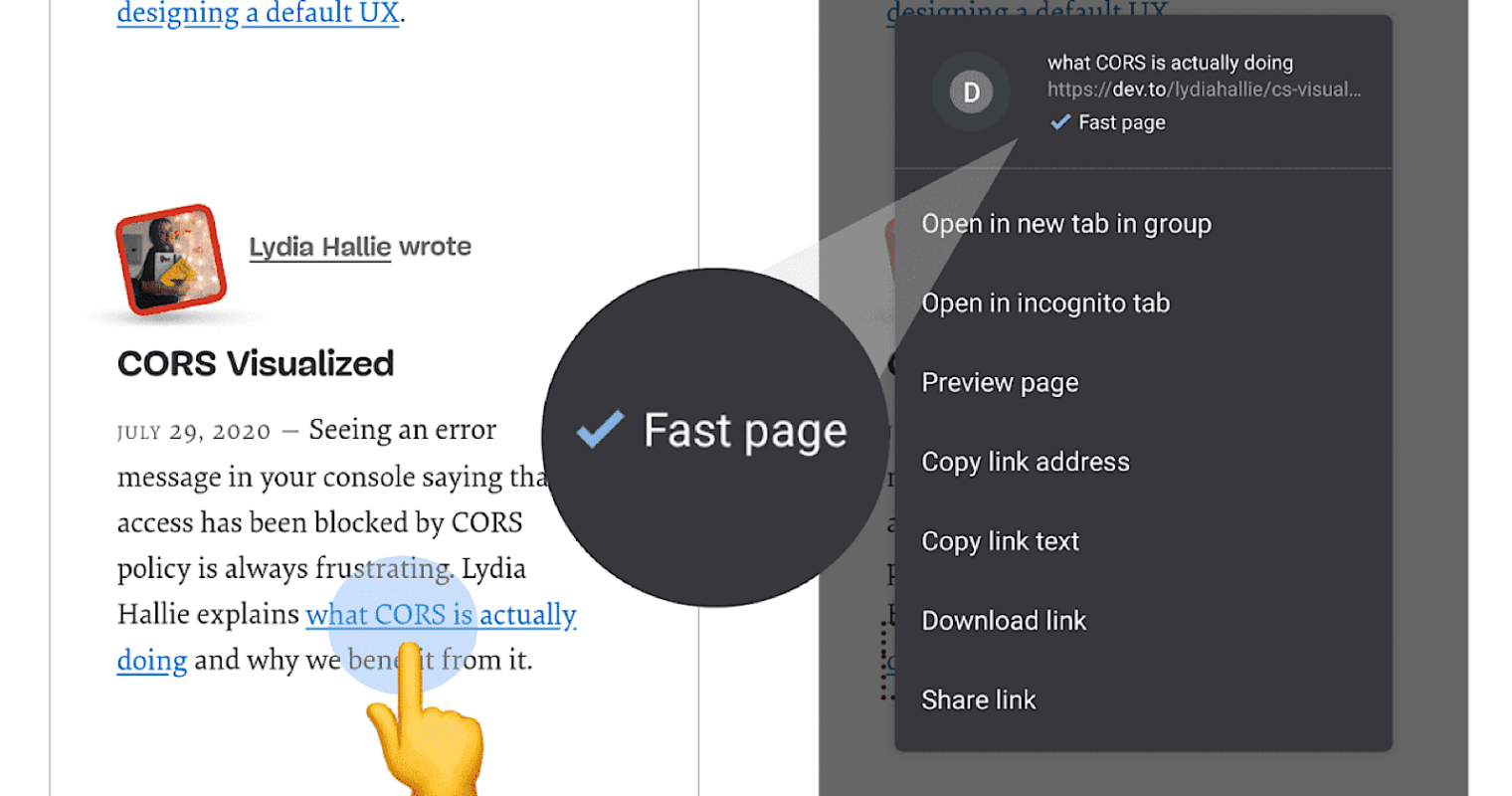
There have been many claiming that Apple has been developing its own search engine to compete with the likes of Google. Speculation arose due to Apple posting jobs for search engineers all around the U.S. and iOS14 Spotlight Search de-emphasising or entirely bypassing Google search results.
Apple has the resources to provide strong competition to Google with the network, technology and resources available to them. This could mean that they could take a large chunk of the market share away from Google. Especially as Google has been criticised for its privacy and Apple is known for taking privacy seriously, this could make many choose Apple above Google.
However, Google is likely to welcome this decision as they would no longer have to pay billions of dollars to be the default browser in Apple products and can point to Apple as a major competitor in antitrust cases.
The Principal Program Manager at Bing stated that they do not want to “index all of the content on the web” and that this involves avoiding a lot of junk and spam. They want to provide quality content for their users and so will need to ensure that the website is of good quality before they index it. Bing wants to avoid showing poor quality or malicious websites appearing in the SERP to improve the user experience.
Bing Does Not Want To Index:
You Should Avoid:
After spending some time in the testing phase, Google has added new features to flight and hotel searches which will show travel trends and advice as well as being able to filter deals which offer free cancellation.
For searches looking for hotels or flights, a small part of the SERP is dedicated to providing trends or advisories in that specific destination. Google is seeking to support those who are travelling during COVID restrictions in an environment with the always-changing travelling advice being published.
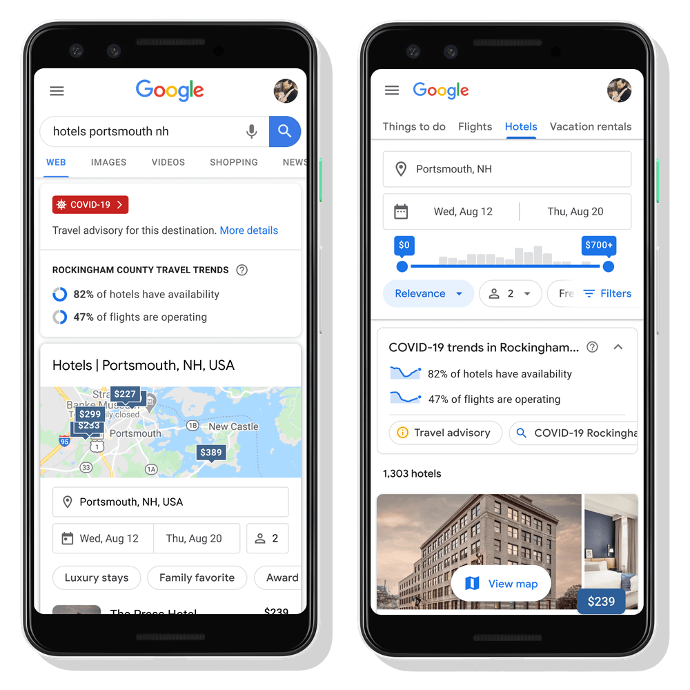
The update also allows users to filter the deals by free cancellation. This will be a welcomed feature for those who are looking to travel but are worried about whether their plans.
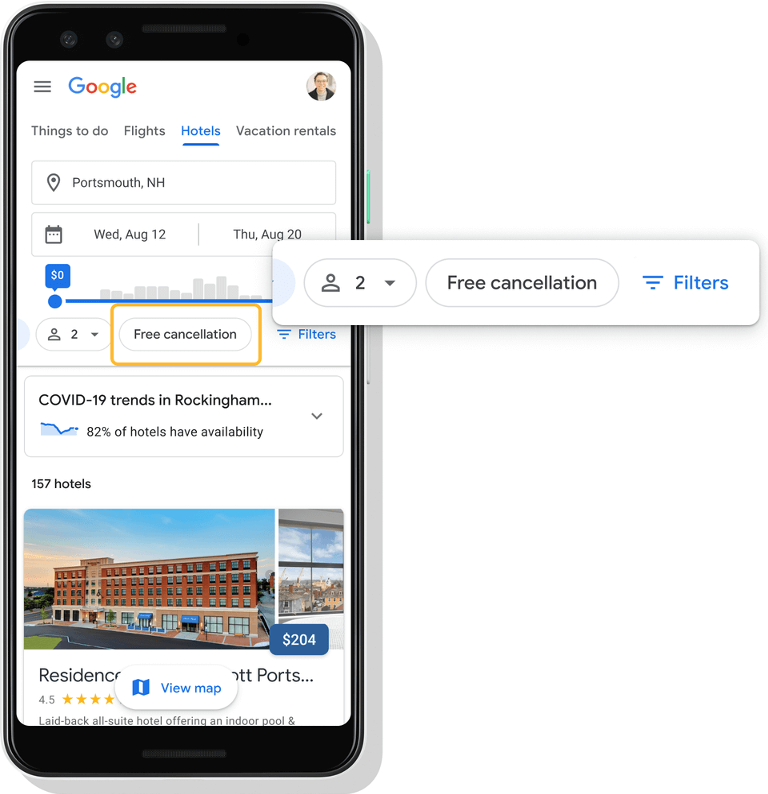
Google is making it easier for sports fans to find where to watch live sports with a new feature which highlights what channels games are on. Currently, this feature is only available for MLB or NBA games but Google said that they are looking to expand into other leagues soon. Searches for where to watch a particular game will return a section which shows the channels showing the games on the search results page.
Google will also show what is currently on TV – not just sports games. A new “On TV Now” carousel shows the programmes currently live. There will also be an “On TV Later” carousel which shows recommendations for future programs to watch.
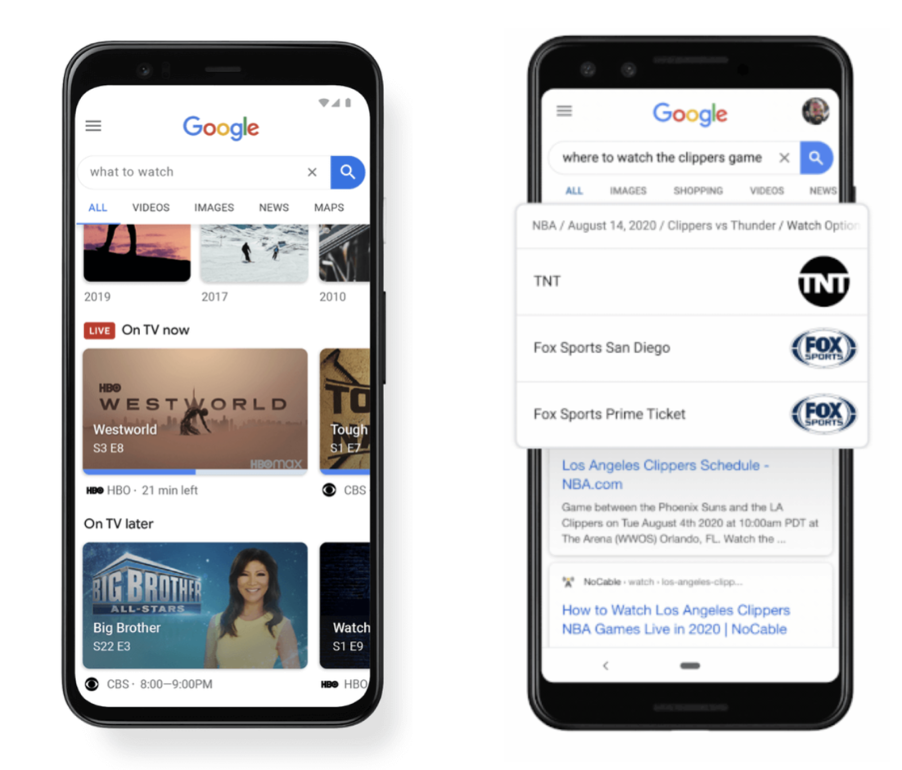
Google is looking to continuously upgrade their structured data testing and add more structured data support. They have now made it possible to test article structured data, allowing you to check how optimised that article page is. Below is an example of an article structured data being tested.
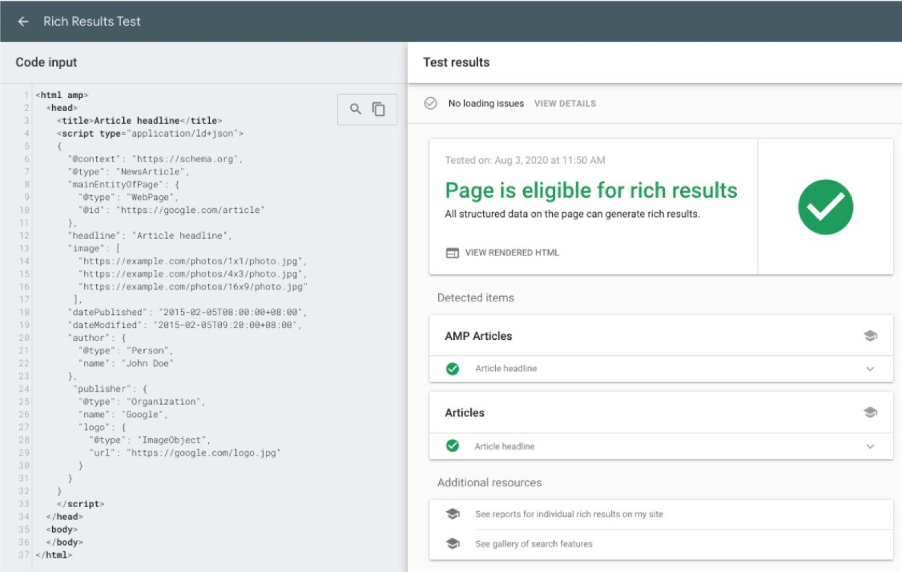
Optimising your articles using structured data can help your site appear for enhanced features such as top stories carousels, rich result features and visual stories. Therefore, this is a small yet important change which will help many website owners to further optimise their content.

3 min read
It’s official, we've added not one, but two shiny trophies to our awards cabinet! We’re over the moon to share that we’ve triumphed at the UK Search...

5 min read
Understand ecommerce attribution models which attribution models can maximise your marketing efforts and ROI.

3 min read
Explore how social commerce is changing the way we shop online, blending social interactions with digital commerce for a seamless buying experience.